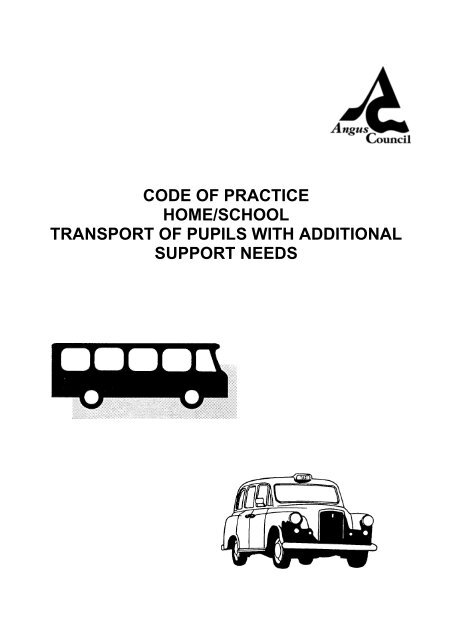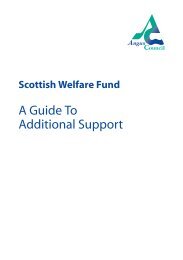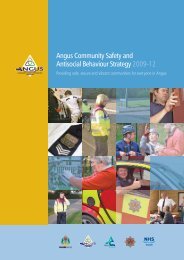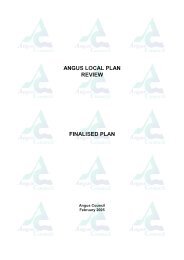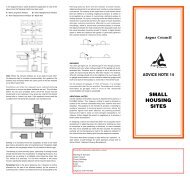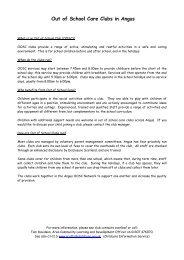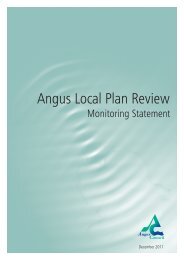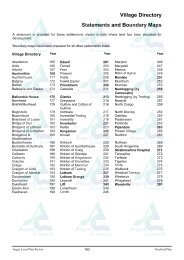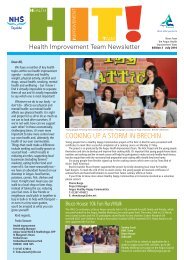Code of Practice Home/School Transport of Pupils ... - Angus Council
Code of Practice Home/School Transport of Pupils ... - Angus Council
Code of Practice Home/School Transport of Pupils ... - Angus Council
You also want an ePaper? Increase the reach of your titles
YUMPU automatically turns print PDFs into web optimized ePapers that Google loves.
CODE OF PRACTICEHOME/SCHOOLTRANSPORT OF PUPILS WITH ADDITIONALSUPPORT NEEDS
The <strong>Code</strong> <strong>of</strong> <strong>Practice</strong> has been produced through liaison between <strong>Angus</strong> <strong>Council</strong><strong>Transport</strong> Team and People Directorate staff. This booklet has no legal standing but waswritten to provide Parents, Contractors’ staff and <strong>School</strong> Staff with a summary <strong>of</strong> their ownresponsibilities and how these connect with the duties <strong>of</strong> other people.We hope this publication helps make it clear who does what, and how things fit together tokeep our most vulnerable children happy and secure during their journeys to and fromschool.The <strong>Code</strong> <strong>of</strong> <strong>Practice</strong> is routinely issued to:-• parents <strong>of</strong> all <strong>Angus</strong> pupils who travel on Special Education transport;• all <strong>Angus</strong> schools, and all schools attended by <strong>Angus</strong>-resident pupils who travel onSpecial Education transport;• all Contractors, for subsequent issue to drivers and escorts <strong>of</strong> special transportcontracts.The <strong>Code</strong> <strong>of</strong> <strong>Practice</strong> is also available on <strong>Angus</strong> <strong>Council</strong>’s website (www.angus.gov.uk).If you have any queries regarding the contents <strong>of</strong> this <strong>Code</strong> <strong>of</strong> <strong>Practice</strong>, please contactthe People Directorate at the address below.If you would like to discuss any operational aspect <strong>of</strong> special education transport, pleasecontact the <strong>Transport</strong> Team at the number given on the final page.CONTENTSPage 1Page 2Page 3-4Page 5-6Page 7-8Page 9-11Page 12-13Page 14Page 15-16<strong>Code</strong> <strong>of</strong> <strong>Practice</strong>People Directorate<strong>Transport</strong>ContractorsThe VehicleDriversEscorts<strong>School</strong> StaffParents/CarersPeople Directorate<strong>Angus</strong> HouseOrchardbank Business ParkFORFAR DD8 1AE First issued April 199808452 777 778 Up-dated July 20131
PEOPLE DIRECTORATEPeople Directorate staff –1. Are responsible for determining entitlement to home/school transport, and forany subsequent review <strong>of</strong> transport provision, for pupils who have additionalsupport needs.2. Are responsible for determining the requirement for an escort and will take intoaccount factors such as parents’/carers’ own assessment <strong>of</strong> their child’s needs, thenumber <strong>of</strong> pupils who are travelling together on the vehicle and the age and supportneeds <strong>of</strong> each individual, as well as reports from schools and contractors about pupilbehaviour.3. Are responsible for authorising and passing on to the <strong>Transport</strong> Team applicationforms and information about pupils to be conveyed, about changes in address andabout any other changes in circumstances. Parents/carers should provide a writtennote <strong>of</strong> this kind <strong>of</strong> change to the People Directorate, giving as much notice aspossible. The minimum notice required will normally be 7 working days duringterm time but at some times <strong>of</strong> the year, and particularly towards the end <strong>of</strong> theschool summer holidays, at least 10 days notice is necessary before changescan be effected.4. Provide the <strong>Transport</strong> Team with information about the need for special equipment(for example booster seats, child seats, wheelchair restraints etc), where suchrequirements are known in advance. If reports from contractors’ staff suggest that inpractice additional equipment is necessary, liaison will take place between the<strong>Transport</strong> Team/People Directorate/parents/other pr<strong>of</strong>essional colleagues (asappropriate), in order to identify the equipment required.5. Liaise with the <strong>Transport</strong> Team on an on-going basis about training for escorts anddrivers. Bespoke training is commissioned when necessary because <strong>of</strong> the particularsupport needs <strong>of</strong> individual pupils. An on-going programme <strong>of</strong> more general trainingis also provided by the People Directorate, and this is certificated under the PATS(Passenger Assistant Training Scheme) administered by staff within the PeopleDirectorate.2
SPECIAL TRANSPORTSUMMARYWhen placement <strong>of</strong> a pupil who has additional support needs is discussed, if there is aneed for special transport this is reported to the Additional Support Needs Section <strong>of</strong> thePeople Directorate.A transport application form is then sent to parent(s)/carer(s) with a return envelope.The letter <strong>of</strong> acknowledgement informs parents that when transport has been arranged,the <strong>Council</strong>'s <strong>Transport</strong> Team will be in touch with them directly.When transport has been arranged, the <strong>Transport</strong> Team will contact the pupil’sparent/carer, usually by letter, approximately one week prior to the start <strong>of</strong> the new term.They will also provide the contractor’s contact details, the date on which transport willbegin and an estimate <strong>of</strong> the pick-up time on the first morning.The driver, and the escort if an escort is required, will contact parents, usually in person,before the first day <strong>of</strong> transport to say hello to the family and discuss any practical details.If for any reason the contractor has not been able to make this contact by the day beforethe contract start date, families are encouraged to telephone him or her direct using thecontact number supplied to them.3
TRANSPORT TEAM1. When they have received an authorised application form from the PeopleDirectorate, the <strong>Transport</strong> Team are responsible for arranging contracts forappropriate home to school transport for pupils who have additional supportneeds.2. <strong>Transport</strong> Team staff determine routes, types <strong>of</strong> vehicles, picking up and settingdown arrangements.3. <strong>Transport</strong> Team staff are responsible for managing contracts, including allocatingnew pupils to routes, arranging changes to routes, negotiating price adjustments and,in consultation with the People Directorate, investigating complaints about transportoperations.4. During emergencies such as breakdown, adverse weather conditions etc. the<strong>Transport</strong> Team is the main point <strong>of</strong> contact for Contractors and school staff and will,if required, initiate any emergency procedures to ensure the safe return <strong>of</strong> pupils toan appropriate place.5. Staff from the People Directorate and the <strong>Transport</strong> Team liaise in determiningindividual pupils’ requirements for special equipment and the allocation <strong>of</strong> thisequipment.6. The <strong>Transport</strong> Team request PVG checks on drivers and escorts who have notalready undergone this process through Taxi Licensing procedures.7. The <strong>Transport</strong> Team monitor contract operations.4
CONTRACTORS1. Contractors must ensure that drivers are appropriately licensed. Contractors arerequired to give PVG Scheme details <strong>of</strong> drivers/escorts to the <strong>Transport</strong> Team priorto contract starting.2. Passengers will be transported only between designated pick-up points at home andschool, unless alternative arrangements have been agreed with the PeopleDirectorate. Each passenger must be handed over to a responsible adult by theescort/driver at the vehicle stopping points at both home/school.3. Passengers must not be transferred from one vehicle to another en route exceptwhere such an arrangement has been specified and agreed with the <strong>Transport</strong> Teamor in the event <strong>of</strong> a breakdown or other emergency. If any child transfers to anothervehicle en route, then the vehicles should meet on the same side <strong>of</strong> the road so thatthe child can transfer without crossing the road. No child will ever be left standing enroute unsupervised whilst waiting for another vehicle to arrive.4. The Contractor will ensure that passengers are taken directly to the intendeddestination (home or school) and under no circumstances must the vehicle deviatefrom the specified service or undertake other work whilst engaged upon the contract.5. All passengers must be provided with their own individual seat on the vehicle. Thecontractor may not 'double up' and place two pupils on an adult seat or three pupilson two adult seats etc. The Contractor must also ensure that the vehicle does notcarry more passengers than it is licensed for.6. Contractors are responsible for the security <strong>of</strong> any special equipment (seats,harnesses etc.) provided by the <strong>Transport</strong> Team and used on vehicles and for thereturn <strong>of</strong> such equipment at the end <strong>of</strong> the contract period.7. The Contractor will ensure that when an escort is specified in the contract such aperson is provided on the vehicle at all times.8. The Contractor will ensure that all escorts are trained to an appropriate standard asspecified by the People Directorate/<strong>Transport</strong> Team. Where practicable this shouldbe achieved within 3 months <strong>of</strong> the Contract start date. Training is available, onrequest, from the <strong>Transport</strong> Team. If escorts do not attend training this may result intermination <strong>of</strong> contract. Should any escort fail to demonstrate a satisfactory level <strong>of</strong>competence on any <strong>Council</strong>-provided training scheme, the Contractor will be requiredto provide a suitable alternative escort within five working days.9. The Contractor must assign regular staff (ie drivers and escorts) to specific routes inorder to avoid undue distress to passengers.10. In the event <strong>of</strong> a vehicle breakdown/hazardous weather conditions, the first prioritymust be to ensure the safety and well-being <strong>of</strong> passengers. Under no circumstancesmust the passengers be left alone and, where practicable, they should remain in thevehicle. If that is deemed unsafe, then they should be escorted to a place <strong>of</strong> safety.The driver must alert the <strong>Transport</strong> Team immediately to any such occurrence. Theutmost care must be taken to minimise passenger distress/discomfort in the event <strong>of</strong>a breakdown.5
11. During winter months, when the weather may be particularly bad and roadshazardous, Contractors must take the decision on whether or not to operate theirvehicle(s). Any decision must be made with the safety <strong>of</strong> passengers in mind.Contractors must alert the <strong>Transport</strong> Team, Parents and the Head Teacher(s) assoon as possible to a decision not to operate.12. The Contractor must report to the <strong>Transport</strong> Team any problems regardingrouting/operational matters, eg access problems, seating, use <strong>of</strong> specialist equipmentetc as soon as is practicable. Problems experienced with behaviour or medicaldifficulties should be reported to the Head Teacher. Repeated misbehaviour shouldalso be reported to the <strong>Transport</strong> Team.13. Should a passenger require urgent medical assistance, the passenger concernedshould be made as comfortable as possible and the driver/escort should dial 999 torequest assistance. Contact should be made with the <strong>Transport</strong> Team andhome/school as soon as possible with an explanation <strong>of</strong> the reason for the delay.6
THE VEHICLE1. All vehicles will meet the requirements contained in the Terms and Conditions<strong>of</strong> the Contract.2. The Contractor must ensure that all vehicles used in the performance <strong>of</strong> the serviceare licensed in all respects, insured, equipped, and maintained in a thoroughly safeand roadworthy condition in accordance with Department <strong>of</strong> <strong>Transport</strong> Regulations,manufacturers' recommendations and the requirements <strong>of</strong> the <strong>Council</strong>.3. The Contractors must provide the <strong>Transport</strong> Team with information on the types <strong>of</strong>vehicles to be operated on the Contract.4. When the Contractor considers it necessary to replace or temporarily substitute avehicle due to service requirements, renewal etc. s/he must ensure that thereplacement vehicle is <strong>of</strong> an equivalent (or better) standard ins<strong>of</strong>ar as, size andaccessibility are concerned.5. The vehicles used will be kept clean to a high standard inside and out and must becomfortable, properly heated and ventilated - vehicles must have the capacity tomaintain a reasonable internal temperature consistent with the needs <strong>of</strong> passengers.6. All Taxis/Private Hire Vehicles used in the performance <strong>of</strong> the Contract must be fittedwith seat belts on all seats. It is the responsibility <strong>of</strong> the driver to ensure that seatbelts are worn by passengers as specified in the <strong>Council</strong>'s Conditions <strong>of</strong> Contract.These Regulations also apply to pupils travelling in the rear seats <strong>of</strong>minibuses.7. The Contractor must fit safely and securely, in accordance with manufacturer'sinstructions, any special child seats, harnesses or other specialised equipmentspecified by the <strong>Transport</strong> Team. These items are supplied on loan by the <strong>Council</strong>for the duration <strong>of</strong> the Contract and must be returned in good condition either ondemand by the <strong>Transport</strong> Team or upon expiry <strong>of</strong> the Contract.8. All vehicles transporting passengers in wheelchairs/buggies must be fitted with theappropriate tracking system on which to secure wheelchairs. A seat belt restraintmust also be provided. These will be utilised at all times.9. All vehicles transporting passengers in wheelchairs must be fitted with a mechanicaltail lift or gradient ramps (which should not exceed 1 in 12).10. All vehicles must be fitted with a First Aid Kit and a Fire Extinguisher. The contents<strong>of</strong> both the First Aid Box and the Extinguisher(s) must be checked at appropriateintervals and replenished as necessary. The location <strong>of</strong> the equipment should beclearly signed, and be accessible without the need for keys.11. All vehicles operated with a capacity in excess <strong>of</strong> eight passenger seats willpreferably have a bottom step a maximum <strong>of</strong> 325 millimetres above the ground, atthe rear <strong>of</strong> the vehicle and at other main exits.7
12. The ro<strong>of</strong> height <strong>of</strong> vehicles which carry more than two wheelchairs should allowescorts to stand upright when assisting passengers to and from seats andmanoeuvring wheelchairs (1.8m minimum).13. All seats must be fitted with appropriate seat belts in accordance with the Conditions<strong>of</strong> Contract.14. Distinctive yellow and black signs must be displayed to the front and rear <strong>of</strong> allvehicles with more than eight seats while transporting pupils to and from school, inaccordance with the Road Vehicles Lighting (Amendment) Regulations 1994. Thesesigns must be plainly visible to other road users.8
DRIVERSDrivers and escorts, like all local authority staff, are expected to maintain rigorousstandards <strong>of</strong> confidentiality about any information <strong>of</strong> a personal nature <strong>of</strong> which theybecome aware in the course <strong>of</strong> their duties.1. Drivers must wear a personal identification badge with a photograph issued by aLocal Authority.2. The driver is in overall charge <strong>of</strong> the vehicle and its operation and is responsible forensuring that the vehicle is driven in a safe and secure manner.3. The driver must comply at all times with current Road Traffic Legislation.4. It is the ultimate responsibility <strong>of</strong> the driver to ensure that all doors are closed, allpassengers seated safely and all seatbelts/wheelchair restraints securely fastenedbefore the vehicle moves <strong>of</strong>f. Wheelchairs and special seats must be secured incompliance with Medical Devices Agency guidance.5. The driver will ensure that the escort (if an escort is provided) fully performs his/herduties in accordance with this <strong>Code</strong> <strong>of</strong> <strong>Practice</strong>. The escort and driver must work asa team with the escort being responsible for the control and supervision <strong>of</strong> thepassengers.6. If necessary the driver should assist the escort in providing help to passengers asthey board and alight from the vehicle.7. Passengers in wheelchairs should be correctly secured in the vehicle in accordancewith the '<strong>Code</strong> <strong>of</strong> <strong>Practice</strong> on the Safety <strong>of</strong> Passengers in Wheelchairs on Buses'(VSE 87/1).8. The driver should ensure that all personal belongings and equipment is safely storedand clear <strong>of</strong> aisles.9. There must be no smoking on the vehicle.10. The driver should approach each stop slowly and with care and ensure that doors arekept closed until the vehicle has been brought to a complete standstill.11. Before moving <strong>of</strong>f, drivers must ensure that doors are properly closed and that nocoats, bags or other obstructions, are caught in the mechanism <strong>of</strong> the door (inside oroutside).12. Before moving <strong>of</strong>f, drivers must check mirrors in case latecomers attempt to board.Particular attention should be paid to the nearside mirror.13. Drivers must never try to deal with a misbehaving child whilst the vehicle is moving.If the driver needs to intervene, he/she should stop the vehicle, deal with the problemand then drive on. <strong>Pupils</strong> must be dropped <strong>of</strong>f at the usual point. The misbehaviourshould be reported to the Head Teacher at the earliest opportunity.9
14. Drivers must make absolutely sure that all disembarked pupils are well clear <strong>of</strong> thevehicle before moving <strong>of</strong>f and that no-one is attempting to return to the vehicle forproperty left behind. Parents/carers must be discouraged from crossing with theirchildren in front <strong>of</strong> or behind the vehicle.15. When reversing, drivers must ensure that everyone is well clear <strong>of</strong> the vehicle.16. No unauthorised passengers should be transported.17. Passengers must not be left unattended in the vehicle at any time except whenassistance is being given to a passenger who is boarding or alighting from thevehicle. The driver must not at any time leave the vehicle completely unattendedwith passengers on board. If a driver has cause to leave his vehicle with the escort incharge, the ignition keys must be removed.18. Drivers must make themselves available to attend training related to themanagement <strong>of</strong> pupils who have additional support needs when required to do so.19. Should a passenger require urgent medical assistance, the passenger concernedshould be made as comfortable as possible and the driver/escort should dial 999 torequest assistance. Contact should be made with the <strong>Transport</strong> Team andhome/school as soon as possible with an explanation <strong>of</strong> the reason for the delay.20. In the event <strong>of</strong> an accident or breakdown, the driver should immediately summonhelp and ensure that the pupils are not left unattended. The contractor and the<strong>Transport</strong> Team must be made aware <strong>of</strong> the circumstances at the earliest opportunityso that appropriate arrangements can be made for the safe completion <strong>of</strong> the pupils'journey. Outside <strong>of</strong>fice hours information for the <strong>Transport</strong> Team may be left on ananswer phone, but all further appropriate measures must also be taken, including, ifnecessary, contacting parents to advise them <strong>of</strong> the situation.21. If a parent or carer is not at home when the driver delivers a passenger, thepassenger must be returned to the vehicle. The driver must alert the <strong>Transport</strong> Teamto the problem immediately by phone and request advice. This advice will usually bethat the vehicle should continue on its route and a note left for the parent/carer toexplain this. The driver should contact the <strong>Transport</strong> Team again at the end <strong>of</strong> theroute and before returning to the home address. The driver may be instructed to takethe passenger to a care agency eg People Directorate - Social Work & Health. Thepassenger should never accompany the driver/escort home. If the parent/carer islate on a regular basis, the <strong>Transport</strong> Team/school staff must be informed.22. Where a child absconds from a vehicle which has no escort, the driver is responsiblefor alerting the school, the <strong>Transport</strong> Team and the Police immediately.23. Drivers must contact parents before the first morning on which transport is to start tointroduce themselves, and the escort if appropriate, and discuss practical details.24. On Contracts where there is no escort, drivers must report any cases <strong>of</strong>misbehaviour by pupils to school staff. On homeward journeys, the parents shouldalso be informed where appropriate.10
25. Repeated or serious misbehaviour and any incidents <strong>of</strong> aggression (verbal orphysical) must be reported to the Head Teacher and <strong>Transport</strong> Team as soon aspossible.11
ESCORTS(It should be remembered that, as noted previously, the driver is in overall charge <strong>of</strong>the vehicle and its operation and is responsible for ensuring that the vehicle isdriven in a safe and secure manner.)1. Drivers and escorts, like all local authority staff, are expected to maintain rigorousstandards <strong>of</strong> confidentiality about any information <strong>of</strong> a personal nature <strong>of</strong> which theybecome aware in the course <strong>of</strong> their duties.2. Escorts must wear a personal identification badge with a photograph issued by aLocal Authority.3. The escort is responsible for the direct supervision <strong>of</strong> the pupils and must remain on,or within the immediate vicinity <strong>of</strong>, the vehicle at all times while passengers are onboard.4. When required by the <strong>Transport</strong> Team, all escorts must attend relevant training whichwould help in their understanding and management <strong>of</strong> pupils who have additionalsupport needs, and in carrying out their duties, for example Passenger AssistantTraining Scheme courses, Emergency First Aid Training or Moving and Handlingtraining.5. Escorts should sit to the rear <strong>of</strong> the vehicle in such a position that they have a goodview <strong>of</strong>, and immediate access to, all the pupils.6. Escorts must ensure that all pupils are properly seated and fastened appropriatelyinto their seat belt, special seat, harness and, in the case <strong>of</strong> wheelchair passengersthat the wheelchair is suitably restrained.7. Where an escort is being provided on a contract, the escort must accompany thedriver to meet the pupil and parent in advance <strong>of</strong> the first day on which transport is tobegin.8. Escorts provide an important link between home and school and should note thetime, place and details <strong>of</strong> any medical or other incident and ensure that it is reportedto school staff on the day <strong>of</strong> the occurrence or, if the incident occurs on thehomeward journey, to the pupil’s parent or carer on arrival at the vehicle stoppingplace. Any incident must be noted in the Behaviour Report Book.9. Upon arrival at the pupil's home or school, the escort should assist the passenger toalight from the vehicle before handing responsibility over to the nominatedresponsible adult who has met the vehicle.10. On no account should a passenger be left either alone or with an unauthorisedperson.11. Escorts must report any cases <strong>of</strong> misbehaviour by pupils to school staff. Onhomeward journeys, the parents should also be informed where appropriate.12
12. Repeated or serious misbehaviour and any incidents <strong>of</strong> aggression (verbal orphysical) must be reported to the Head Teacher and <strong>Transport</strong> Team as soon aspossible.13. Escorts should ensure the safe transit <strong>of</strong> passengers' belongings and specialequipment if required.14. If a pupil absconds whilst under the care <strong>of</strong> an escort, they must inform the school,the <strong>Transport</strong> Team and the Police immediately.13
SCHOOL STAFF1. In the case <strong>of</strong> pupils who have significant additional support needs school staff will beexpected to share with the escort and driver information which could help them tobetter carry out their duties and responsibilities. This could include, for example,information about short term medical and/or behavioural issues but only if these arelikely to have an effect on how the pupil may behave on the vehicle. Escorts anddrivers, like school staff, are expected to maintain rigorous standards <strong>of</strong>confidentiality about any information <strong>of</strong> a personal nature <strong>of</strong> which they becomeaware in the course <strong>of</strong> their duties.2. Any messages received by school staff during the course <strong>of</strong> the school day aboutemergency changes to transport arrangements, for example a change <strong>of</strong> person whowill meet the pupil at home that day, must be passed on to the escort.3. Should a transport vehicle fail to arrive, staff should contact the Contractor in the firstinstance, and schools are advised to keep a note <strong>of</strong> the Contractor’s contact numberas it appears on the notification to parents which is routinely copied to schools. The<strong>Transport</strong> Team should also be informed about this kind <strong>of</strong> problem and about anyother difficulties with transport provision, such as, for example, persistent poortimekeeping. <strong>School</strong> staff may complete a Discrepancy/Irregularity Report when anyaspect <strong>of</strong> a contractor's service falls below expected standards. TheDiscrepancy/Irregularity Report template is available on the Education Intranet siteand should be completed and forwarded to Ged Gilmartin, Principal Officer (PhysicalResources) (GilmartinG@angus.gov.uk), <strong>Angus</strong> House, Forfar and copied to the<strong>Transport</strong> Team, County Buildings, Forfar (LowrieP@angus.gov.uk).4. <strong>School</strong> staff are expected to meet the vehicle at the agreed stopping place and takepassengers to and from the vehicle. The duty to take the pupils on and <strong>of</strong>f the busrests with the escort and driver.5. <strong>School</strong> staff should ensure, if possible, that pupils have visited the toilet beforeboarding vehicles.6. Where problems are identified with seating, use <strong>of</strong> equipment or other transportissues, school staff should email Lesley Eaton, <strong>School</strong> Travel Administrator(EatonLA@angus.gov.uk) for advice.7. <strong>School</strong> staff are responsible for ensuring that parents are made aware <strong>of</strong> anysignificant incident which has taken place on the vehicle which is reported to them bythe escort or driver.8. People Directorate staff are responsible for ensuring that the <strong>Transport</strong> Team areinformed <strong>of</strong> any changes <strong>of</strong> address <strong>of</strong> pupils or other changed circumstances (forexample a child leaving school) which affect the home-to-school transport as soon asthey become aware <strong>of</strong> these. It is, however, requested that if school staffbecome aware <strong>of</strong> any change which may affect transport they report this to the<strong>Transport</strong> Team as soon as possible.14
PARENTS/CARERS1. Parents/Carers are asked to let the driver or escort know if their child will not betravelling on any particular day because <strong>of</strong> illness or some exceptional circumstance.Contractors and their staff appreciate being told that a child will not be travelling, asthis helps avoid unnecessary trips. Parents/carers are in any case strongly advisedto keep note <strong>of</strong> their contractor’s contact number so that direct liaison is possibleshould this be necessary, for example in winter weather conditions.2. Parents/Carers should also let the escort know if any difficulties may affect their childon any particular day.3. If parents or carers have any concerns about the day to day running <strong>of</strong> the contractthey should contact the <strong>Transport</strong> Team (01307 461774) as soon as possible.4. If parents have information about changes such as, for example, a proposed newaddress or details <strong>of</strong> a new wheelchair which is about to be issued, they are asked tocontact the People Directorate - Education (08452 777 778) as soon as possible.Parents are asked to give as much advance notice <strong>of</strong> any change as possible andshould note that due to particular pressures at some times <strong>of</strong> year a minimum <strong>of</strong> 10working days can be required.5. The <strong>Transport</strong> Team advises Contractors <strong>of</strong> the wheelchair specificationrequirements for each child and provides them with the specialist wheelchairrestraints required to secure the chair. Where any new chair is provided for a childthe <strong>Transport</strong> Team will advise the Contractor <strong>of</strong> the change and supply them withthe appropriate restraints required for that specific chair. It is therefore essential thatany proposed changes are notified as soon as possible – you should contact thePeople Directorate - Education (08452 777 778). Parents should note that due toparticular pressures at some times <strong>of</strong> the year a minimum <strong>of</strong> 10 working days can berequired. Please note that there have been instances where wheelchairs have beenpresented which are unsuitable for transportation - Contractors are therefore notpermitted to convey any chair other than that advised by the <strong>Transport</strong> Team.<strong>Transport</strong> to <strong>School</strong>6. Parents/Carers should make sure that their child has visited the toilet before he/sheboards the vehicle.7. If a pupil wears a harness other than that fitted in the vehicle, parents/carers shouldmake sure he/she is wearing it correctly before the vehicle arrives.8. Parents/Carers must take their child to the normal vehicle stopping place at theagreed time.9. It is the responsibility <strong>of</strong> the driver/escort to take pupils on to and <strong>of</strong>f the vehicle.15
<strong>Transport</strong> from <strong>School</strong>10. Parents/Carers must meet pupils at the normal vehicle stopping places at the agreedtimes.11. If parents/carers cannot be at home when a pupil is due home, they must let theescort/driver know who will meet their child at home that afternoon. This informationshould also be confirmed with the school. If a child is to be returned to a place otherthan the normal stopping place, then parents/carers will be responsible for makingtheir own alternative transport arrangements. In such circumstances parents shouldlet the driver/escort and the school know that the usual transport will be not berequired home from school that afternoon and what the alternative arrangements are.Parents should be aware that drivers are not allowed to vary their route on request.12. If, due to emergency circumstances, no-one is at home when the vehicle arrivesthere, parents/carers should be aware that the following procedures will be followed:- the driver will wait 5 minutes and, if this is an option, will then continue on hisjourney with the other pupils and return to the house from the end <strong>of</strong> his route. if there is still no-one at home and the emergency contact person cannot becontacted, the driver may be advised to take the child to a care agency suchas the People Directorate - Social Work & Health. If this is necessaryparents/carers will be responsible for collecting their child on their return.Drivers/escorts have been instructed not to take pupils home with them.13. Parents/carers are asked to make sure that information which they would like to bepassed on to school staff is in writing, to avoid any possibility <strong>of</strong> misunderstanding.14. Children's school equipment and personal belongings should be contained in anamed bag wherever possible.Emergency Procedures15. Should a passenger require urgent medical assistance, the passenger concernedshould be made as comfortable as possible and the driver/escort should dial 999 torequest assistance. Contact should be made with the <strong>Transport</strong> Team andhome/school as soon as possible with an explanation <strong>of</strong> the reason for the delay.16. Parents will be advised by the driver/school staff <strong>of</strong> any significant incident on thevehicle which involves their child on the day that the incident occurs.16


